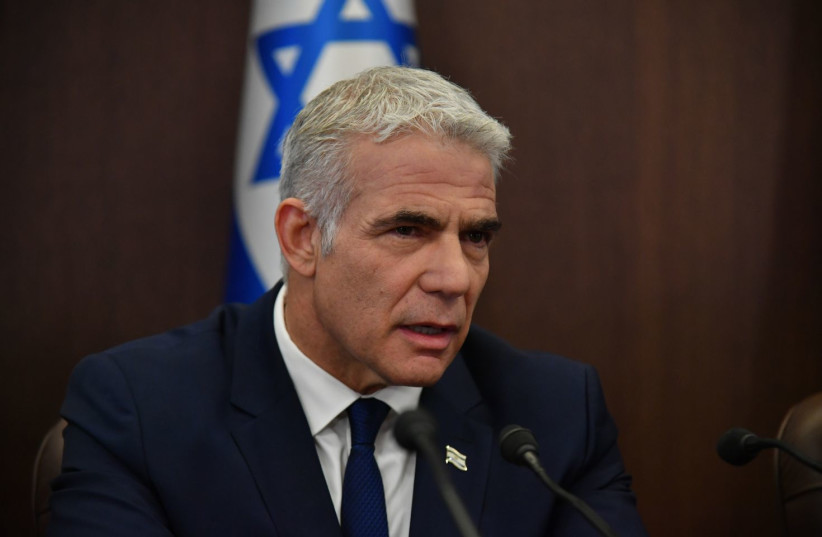Yair Lapid may have achieved peak political success when he became prime minister at midnight Thursday, but he reached the apex of fame in Israel long before he ever even ran for the Knesset.
Born in 1963 to prominent journalist Tommy Lapid – a Holocaust survivor who was Israel’s justice minister in the early aughts – and acclaimed author Shulamit Lapid, Yair began writing a weekly newspaper column for Israel’s most popular weekend papers, first in Maariv and then Yediot Aharonot, from 1989 until he entered politics in 2012. The column covered a variety of topics, ranging from mostly liberal-left politics to social issues, identity, and more.
Throughout that period, he established himself as a sort of cultural renaissance man. He wrote the lyrics to 22 songs, some of which were pop hits; he acted in a few movies, including as a romantic interest; he wrote 10 books, mostly novels. He was also an amateur Thai boxer and a fixture on the Tel Aviv club scene, known for dancing on tables with his celebrity friends.
Lapid's talk show
But perhaps the thing that really made him one of the most famous people in the country is his decade as a talk show host.
Lapid interviewed some of the most prominent people in Israeli politics, including prime ministers Yitzhak Shamir, Shimon Peres, Benjamin Netanyahu, Ehud Barak, Ariel Sharon and Ehud Olmert, and around the world, like the Dalai Lama, Bill Gates, Stephen Hawking, Arnold Schwarzenegger and Julia Roberts.

Sporting his trademark black t-shirt, which he said he always wore because he is colorblind, he would ask guests a version of the Proust Questionnaire, with the most famous question being “What is Israeli to you?”
Lapid’s talk show was also known for launching the careers of some of Israel’s most successful comedians, like Lior Schleien – Labor leader Merav Michaeli’s partner – and Adi Ashkenazi.
In 2008, he became the anchor of Israel’s most-watched news program, Friday nights on Channel 2.
Four years later, Lapid resigned from the news and wrote the column that would launch his political career, famously titled: “Where’s the money?”
Inspired by the housing protests of the previous summer, Lapid asked: “Why doesn’t the productive class, that pays taxes, does its duties, serves in reserves, holds the whole country on its back, not see the money?” He accused the government of being wasteful and corrupt.
Lapid campaigned on economic reform to help the middle class, fighting corruption and requiring all citizens – he meant haredim – to serve in the IDF or civilian service.
Lapid also supported, and continues to support, a two-state solution that would involve Israel annexing major settlement blocs while evacuating those that are smaller and more distant from the Green Line.
This was also the point at which political opponents and media figures started to note that Lapid was a high school dropout with no college degree, and his IDF service was at the military’s Bamahaneh magazine. He will be one of the few Israeli prime ministers not to have combat experience.
Yesh Atid headed by Yair Lapid
The Yesh Atid Party that Lapid founded won 19 seats in its first election in 2013, putting him in the finance minister’s seat.
That was when Lapid and departing prime minister Naftali Bennett formed their “bond of brothers,” a 31-seat bloc that negotiated together in coalition talks, which forced prime minister Netanyahu to bring Bennett, whom he disliked, into the coalition, and to leave the haredim out at Lapid’s demand.
Lapid’s first term in the Knesset was marked by constant fighting with the haredi parties over IDF service, matters of religion and state, welfare reform, and more. Haredi rabbis, politicians and media railed against him with biblical and liturgical terminology, calling him Amalek, and wishing to “remove a malicious government from the Land.”
That government was short-lived, and Netanyahu fired Lapid a year and a half later.
Lapid fared worse in the 2015 election, and though he was not officially opposition leader – a title that went to Isaac Herzog, who led Labor to its greatest electoral achievement in over a decade – Lapid acted like he was anyway. With a combination of his talk-show charisma in his speeches to the Knesset, and a seemingly unquenchable thirst for jet-setting to capitals around the world for meetings with foreign officials and Jewish communities, he was able to keep his political star bright even when he was technically just one of 120 legislators.
Ahead of the first 2019 election, Yesh Atid merged with Benny Gantz’s Israel Resilience Party to form Blue and White, and Lapid took second place on the list in light of Gantz’s stronger polling at the time. The block tied with Likud at 35 seats in April 2019, and in the subsequent election that year, the party won 33 seats, one more than Likud. The bloc broke up in 2020 after the third election, when Gantz negotiated to join a government led by Netanyahu, with whom Lapid refused to sit because of the corruption charges against him.
Yesh Atid was the second-largest party after the 2021 election, which meant Lapid ended up being tasked with forming a coalition after Netanyahu, whose Likud party was the largest, failed to do so. He reached an agreement with Bennett by which his Yamina party would complete the majority needed in the Knesset, and Bennett would go first in a rotation as prime minister.
However, the agreement also stated that if one of the right-wing parties in the coalition leads to its downfall and a new legislative election, then Lapid would become prime minister of the caretaker government, as he did on Thursday.
